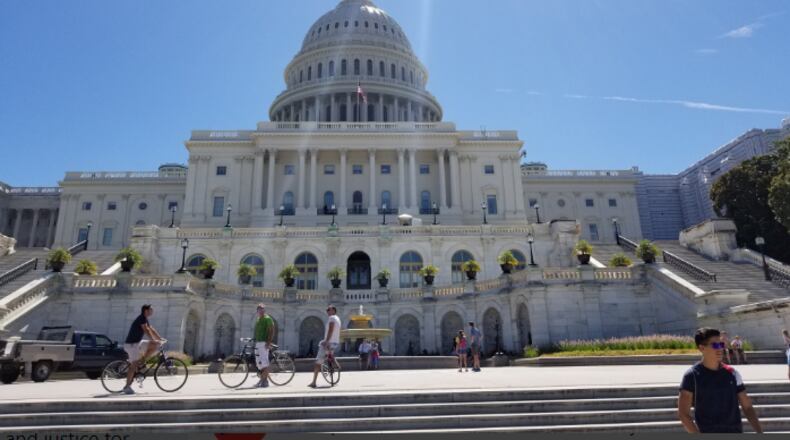Here are some things to watch as lawmakers return to the heat and humidity of Washington, D.C.
1. Trump wants action on immigration. Don't bet on it.
As the President battles with Democrats over the border, Mr. Trump has made clear repeatedly that he wants legislation approved by Congress to make major changes in U.S. immigration laws, with the overall goal of making it easier to deport people who have come into the country illegally. As of now, Republicans and the White House agree on the goal, but don't have the details of any bill ready for a vote. So, with action unlikely in either the House or Senate, look for the President to get as much political mileage out of the issue as he can.
Democrats must change the Loophole & Asylum Laws - but they probably won’t! They want Open Borders, which means massive crime and drugs! https://t.co/IWxH16arMW
— Donald J. Trump (@realDonaldTrump) July 6, 2019
2. Democrats want answers on immigration detention centers. While the President demands action on immigration law changes, Democrats will return this week calling for major reforms in how immigrants are treated in overcrowded detention centers. Look for those hearings to also focus not only on the conditions inside the facilities, but also on recent news reports about Facebook groups of current and former Border Patrol agents, and some of their anti-immigrant and racist posts - along with posts which go after certain Democratic members of the Congress. The hearing is supposed to happen on Friday. We'll see if it does.
House Oversight Cmte Chair Cummings invited Acting DHS Sec Kevin McAleenan & Acting CPB Commissioner Mark Morgan to testify at July 12 hearing on “troubling new revelations about the Trump Admin’s family separation policy & harsh conditions at detention centers on the border.” pic.twitter.com/iptS8DemqE
— Craig Caplan (@CraigCaplan) July 3, 2019
3. The budget process remains an unfinished mess.
The fiscal year runs through the end of September, as Congress has to finish the twelve annual government funding bills by then, or approve a temporary spending measure to keep the government running. So far, no deal has been reached on exactly how much to spend for 2020, or whether to change the budget spending caps, which limit the amount of spending. If there's no deal on that, it would bring about automatic budget cuts under the sequester. The House has approved ten of twelve government funding bills for next year, while none of those measures have made it yet to the Senate floor. The House has 25 work days scheduled between now and September 30. The Senate has 35 days. The last time Congress finished its spending work on time was in 1994 and 1996. It won't happen in 2019.
The House has yet to:
— Rep. Rob Wittman (@RobWittman) June 28, 2019
- pass a bipartisan budget 💰
- address the debt ceiling ⏳
- adjust budget caps 🧢
With < 35 legislative days til end of the fiscal year, Congress should remain in DC until the work is complete.
4. Why is there so little time to get any work done?
You can see on the calendar below that there is a very clear hole in the summer when lawmakers are not in D.C. That's what we call the August Recess. In 2018, Republicans kept the Senate in session for a chunk of that five week break, passing government funding bills and acting on nominations. So far, there's been no talk of a repeat this year. Democrats in the House have made no noise about sticking around into August. We all know from our own lives that vacations are good for the soul. But when the House and Senate are on break for an extended period of time, that means little in the way legislating is getting done, whether that's working on the budget, dealing with illegal immigration, or any other pressing issue.
5. Congress waits to see what happens on the Census.
As the President has threatened to use an Executive Order to force the addition of a question to the 2020 Census form on citizenship, Democrats are still trying to get documents and information from the Trump Administration about the matter - but their subpoenas have gone unanswered. If the President goes forward with some type of executive action, that will add even more political fire to this subject, as on Sunday night, the Justice Department announced it was changing out the lawyers who had been doing the legal work on the citizenship query.
BREAKING. New team of DOJ lawyers is taking over census case. No explanation provided pic.twitter.com/AqW13r09o7
— Del Quentin Wilber (@DelWilber) July 8, 2019
6. Mueller testimony will dominate next week's news.
July 17 is the date for public testimony before a pair of House committees by Special Counsel Robert Mueller. Even if Mueller does not make any substantive 'news' during his appearance, the event will dominate the news in the run up to his testimony, and is certain to draw public comment from the President as well. The hearing comes as the number of Democrats in the House who want to start an impeachment inquiry has grown - but polling has shown that's mainly something Democrats are interested in at this point in time.
WEDNESDAY, JULY 17: Former Special Counsel Robert Mueller testifies before the House Judiciary Committee – LIVE at 9am ET on C-SPAN3 https://t.co/dnHyenSb79 pic.twitter.com/6kR8nlmziJ
— CSPAN (@cspan) July 1, 2019
About the Author

